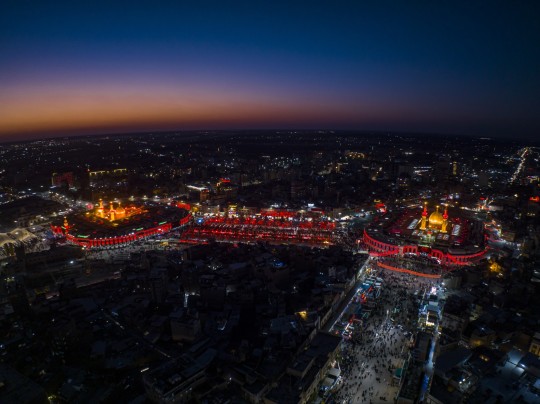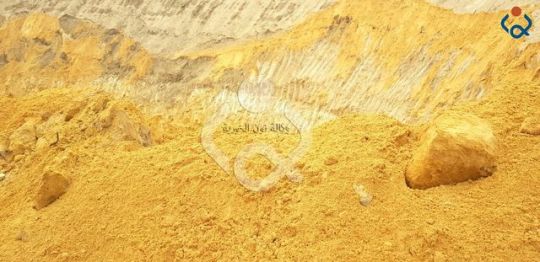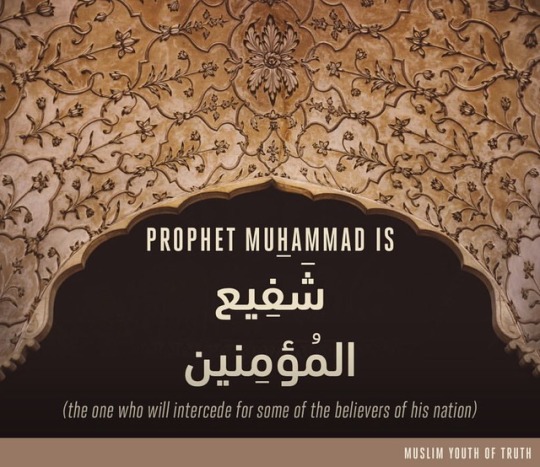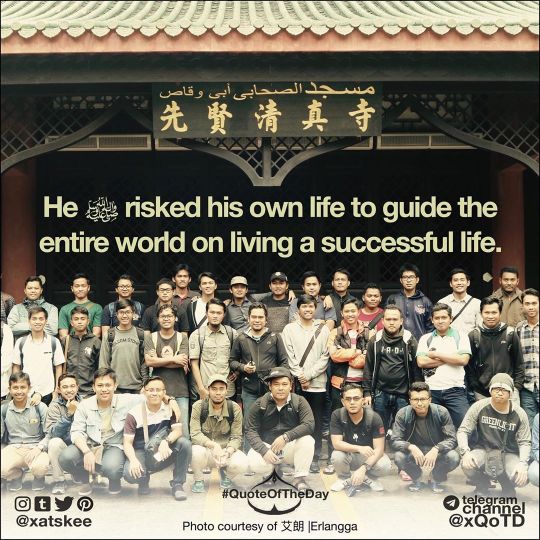#whoismuhammad
Text

الإمامُ الصّادقُ (عَلَيهِ الّسَلامُ) : العِزُّ أنْ تَذِلَّ للحقِّ إذا لَزِمَكَ
Imam al-Sadiq (a.s.) said, ‘Honour is that you humble yourself to the truth when you face it.’
—Bihar al-Anwar, v. 78, p. 228, no. 105
29 notes
·
View notes
Text

#weheartislam#allah#islamicreminders#prophetmuhammadﷺ#allahuakbar#islamicquotes#reminder#whoismuhammad#islam#muslim
94 notes
·
View notes
Text

“They think he (ﷺ) is a normal man! This is the man (ﷺ) that will stand beside the throne of Allāh, no one else will have that, no one.”
— Shaykh Babikir Ahmed Babikir
#whoismuhammadﷺ#whoismuhammad#muhammadﷺ#prophet muhammad#prophet#sufi#islam#scholar#sufi world#scholars#habib#sufiworld#sufism#shaykh#love
1 note
·
View note
Photo

Ya_nabi salam_alaika #whoismuhammad #muhammad #prophet #allah #islam #beauty #beloved #botb #beauty_of_the_beloved #beautyofthebeloved #musulman #muhammad #rasoolallahﷺ #assalamualaikum #yarasoolallah #habibi #quran #muslim #allah #allahuakbar #mekha #madina #mecca https://www.instagram.com/p/BzbP2CUhtw8/?igshid=16fnmhqqyx6bs
#whoismuhammad#muhammad#prophet#allah#islam#beauty#beloved#botb#beauty_of_the_beloved#beautyofthebeloved#musulman#rasoolallahﷺ#assalamualaikum#yarasoolallah#habibi#quran#muslim#allahuakbar#mekha#madina#mecca
1 note
·
View note
Photo







During the digging process to expand the shrine of Imam Hussain (as) in Karbala, and at a depth of 14 meters underground the workers noticed that the colour of the dust began to change... The original sands of Karbala seem to Sparkle like Gold. ❤️ Labbaik ya Hussain(ع) ♥
#Karbala#Najaf#Iran#Iraq#Shia#Imam hussain#Whoishussain#Whoismuhammad#Samarra#Kazmain#Mashad#Qum#Madina#Mecca#Baghdad#Imam hassan#Ahlulbayt#Sahaba#Rajab#Shaban#Ramadan#Bainul Haramain#Haj#Salat#Quran#Imam mahdi
209 notes
·
View notes
Photo

Prophet Muhammad, may Allah raise his rank, said:
شَفَاعَتِي لأَهْلِ الْكَبَائِرِ مِنْ أُمَّتِي
This means: “My intercession is [reserved] for the major sinners of my nation.” (Related by Abu Dawud)
2 notes
·
View notes
Photo

THE SIGNS OF A HYPOCRITE.
.
.
#WhoIsMuhammad
.
https://www.instagram.com/p/BpSpKXUgEHN/?utm_source=ig_tumblr_share&igshid=1ecc8fxltcqxs
4 notes
·
View notes
Text
Evening Long Sleeve Maxi Dresses at muniraismail.com
Buy beautifully designed long sleeve an floral maxi dress which is perfect for any evening party. Munira Ismail is your one stop shop for all kinds of modest clothing in unite kingdom. You can visit our website for more!
2 notes
·
View notes
Photo

#QuoteOfTheDay (20191109): “Dia mempertaruhkan hidupnya untuk menuntun seluruh dunia menjalani kehidupan yang sukses.” Di dalam berbagai sirah Nabawiyah, ketika berdakwah, Rasulullah ﷺ kerap dilempari kotoran, dilempari batu, dihina, dicaci maki, nyaris dibunuh. Namun beliau tetap tegar. Tidak mau mengatakan doa pamungkasnya seperti yang diminta oleh malaikat agar Allah menurunkan azab-Nya. Beliau simpan doa pamungkasnya untuk memberi syafaat umatnya di hari kiamat kelak. Sungguh luar biasa cinta dan kasih sayang beliau ﷺ kepada umatnya agar semuanya sukses masuk ke surga Allah. Mari kita tunjukkan cinta yang sama dengan meneladani, menghidupkan sunnah-sunnahnya dan bershalawat atasnya. “Sesungguhnya Allah dan Malaikat-malaikat-Nya bershalawat untuk Nabi. Wahai orang-orang yang beriman, bershalawatlah kalian untuk Nabi dan ucapkanlah salam penghormatan kepadanya." (QS. Al-Ahzaab: 56) #Rasulullah #Muhammad #Risked #Life #Guide #World #Ummah #Live #Successful #Duaa #Syafaah #WhoIsMuhammad Telegram Channel: https://t.me/xQoTD https://www.instagram.com/p/B4nq3hcgU6n/?igshid=aet3n17c2kma
#quoteoftheday#rasulullah#muhammad#risked#life#guide#world#ummah#live#successful#duaa#syafaah#whoismuhammad
0 notes
Text
الإمامُ عليٌّ (عَلَيهِ الّسَلامُ): الصِّدقُ يُنجِيكَ وإن خِفتَهُ ، الكِذبُ يُردِيكَ وإن أمِنتَهُ
Imam Ali (a.s.) said, ‘Truthfulness saves you even though you fear it whereas lying ruins you even though you feel safe from it.’
—Ibid. nos. 1118-1119
13 notes
·
View notes
Text

What does it mean to ask for Allah's Forgiveness?
Allah is At Tawwab, The One who beckons for our return. He repeatedly turns mankind towards repentance should they journey temporarily on the wrong path. He is The Acceptor of Repentance, The Oft-Forgiving, The Acceptor of our return.
Allah is lenient and restores grace to those who repent and forgives those who seek forgiveness.
“Allah is more pleased with the repentance of His slave than anyone of you is pleased with finding his camel which he had lost in the desert.” (Al-Bukhari)
To repent means to return to Allah and intend to obey Him for the rest of one’s life. For repentance to be valid and, thus, accepted, five preconditions have to be observed; these are:
1. To be sincere to Allah.
2. To regret one’s past evil deeds.
3. To give up sinning.
4. To make a firm resolve of avoiding such sins in the future.
5. To show repentance while it is still valid.
Forgiveness for one’s sins is not something that comes automatically; it is something that must be sought for, with sincerity and true devotion. Becoming indifferent to one’s sins is fatally dangerous.
May Allah forgive us all and guide us to the straight path. Ameen.
#weheartislam#allah#islamicreminders#prophetmuhammadﷺ#allahuakbar#islamicquotes#muslim#reminder#whoismuhammad#islam
35 notes
·
View notes
Photo

Twenty-six years ago, I became a Muslim-largely because I fell in love with a beautiful Human being. “I was only sent to, perfect noble character,” said the Man declared as a “Mercy to all the worlds.” As time passed, this love grew as my knowledge of Him increased. I painfully watched His religion hijacked by some for their, own ends distorting His message and forgetting that He was indeed a Mercy to all the worlds. I am troubled by the media’s portrayal of Him sometimes in the worst of lights. How could the man I came to know and love to be so vilified and maligned by those who claim to represent Him and also by those who aim to be unbiased interpreters? Muḥammad (ﷺ), was a shy, reticent man who lived among his people with such high moral character they called him al-Amin — the Trustworthy. The Prophet of Islām was born in the city of Mecca, Arabia, into a poor but noble branch of an aristocratic clan known as Quraysh, a People who despised treachery, lies, and stupidity, while honoring bravery in battle, generosity in partying, and cleverness in poetry. Some families, were so ashamed of their baby girls, that they would bury them alive instead of suffering the possible indignity of future dishonor. The religion of the Arabs at the time was a hodge-podge of superstition, divination, and idolatry. To them, man’s Life ended with his death and his afterlife was based on his military exploits might be immortalized by a poets tongue. The Prophet Muḥammad (ﷺ), was born into this world on April 9th, 570, Christian era in the lunar month of Rabīʿ al-ʾAwwal. His father, ʿAbdullāh died during his mother’s pregnancy. And for the first four years, He was raised in the relative purity of the desert by a Bedouin woman named Halimah. After which He returned to His mother, ʼĀminah. But in His seventh year, His mother died leaving Him in the care of His grandfather. At the age, of twenty-five, He was employed as a commercial agent by Lady Khadījah, a Successful widow, from His own, clan. She soon recognized His honesty and good nature and proposed marriage. Although fifteen years younger than she was, He accepted her proposal and fathered six of his seven children with her. At the age of forty, it had become his custom to escape the idolatry of Meccan society by seeking solitude in a cave on the mountain known as “the Mountain of Light.” In the solitary confines of his small cave, a voice pierced his consciousness declaring: “Recite (Iqrā)!” Alarmed and shivering He fled to his wife, begging her to wrap him in a cloak. He feared for his sanity, concerned that a desert spirit or poetic muse might be pursuing Him. More revelations soon followed, and Muhammad (ﷺ) came to an understanding that, He was not only a prophet in a long line of prophets but that he was the last of them who was sent, with a universal message. As the days passed his revelations increased and they were powerfully rhythmic punctuated with intoxicating messages that challenged listeners to reflect on everyday miracles such as the alternation of the night and day. These revelations revealed to Muhammad (ﷺ), came to be known as the Qurʾān, the Muslim Holy book. For thirteen years he invited his clan to worship one God, sit with slaves in spiritual solidarity, respect women as soul-full equals and the source of human mercy, care for the widow, the orphan, the weak and the oppressed. At first, people ridiculed his message and accused Him of attempting “to make the Gods one.” His Message threatened his people’s financial control of the markets of Mecca where pilgrims from all over Arabia came to spend their wealth. When his clan failed to stop his preaching, they plotted to kill him in his sleep. But he was warned by the Angel Gabriel and told to flee in the cover of darkness to Madīnah with his beloved friend and lifelong companion Abū Bakr aṣ-Ṣiddīq. Setting out, the two sought refuge in a cave to escape the skilled trackers of Mecca hot on their trail. The bounty hunters quickly came upon the cave, but a spider’s web had already covered the entrance, and a dove with her young rested in a nest above it. When the posse left, and the two felt safe again, they continued their journey to the city of Yathrib. And as they entered it the young girls and children of Bani Najjar came out chanting lines of poetry which are still sung all over the world in remembrance of this auspicious occasion. The name Yathrib was changed, to Madīnah, the city of hope. It became a city founded on the brotherhood of virtue. The Prophet (ﷺ), enacted a treaty uniting the once warring groups. He secured the rights of the Jewish minority by granting them full citizenship and freedom to practice their religion without constraint. Days after His arrival in Madīnah, He began the construction of a mosque, a sanctuary of prayer and meditation, in the center of the city. And He had His companions; the Muslims create their marketplace to ensure economic strength. The Meccans, sensing that a rising power was now emerging in the peninsula, plotted ways of subverting the Prophet (ﷺ), and his growing community of believers. And the Prophet (ﷺ), who had practiced a strict pacifism in Mecca for thirteen years and disliked the use of coercive force, was now given permission, by God to defend against any attacks by his enemies. The Qurʾān declared, “Fighting (in self-defense, for the restoration of peace and elimination of mischief and violence) has been made incumbent upon you although you are averse to it by temperament. It may be that you dislike a thing and (in fact) that is good for you. And it is (also) likely that you like a thing but (in fact) that is bad for you. And Allāh knows well, but you do not know.” [Qurʾān, 2: 216 ], The Prophet (ﷺ), said, “Never desire to meet your enemies, rather ask God for peace and well-being; but should you be forced to meet them, then act courageously.” [Ṣaḥīḥ al-Bukhārī ] Muslims are not ashamed of their Prophet’s teaching about war. On the contrary, for us, it is a Great source of pride. He was courageous as a great lion against the strong and oppressive yet gentle as a shepherd with the weak and the oppressed. The valid object of the war fought for God should always be peace. What the Prophet (ﷺ), taught is that Muslims just battle for cause only. In this world, there are only two choices: two sides, truth, and justice or falsehood and oppression. You don’t have to be a Muslim to understand that. After years of conflict between members of his clan and his followers, the Prophet(ﷺ), had a revelation that He should visit the sacred mosque. In the eighth year after his migration to Madīnah the Prophet(ﷺ), set out for Mecca but his adversaries refused to allow him in. They sent out an arbitrator to strike an agreement that would bring the stand-off to an end. And on every point of this treaty the Prophet (ﷺ), compromised his position in pursuit of peace. On the journey back to Madīnah some of the companions were deeply troubled by what had just taken place and disappointed that they were, thwarted from visiting the sanctuary. When asked to explain, the Prophet(ﷺ), replied, “Did I say it was going to be this year?” And so the following year, by the treaty, the Prophet (ﷺ), and his followers performed a pilgrimage completely unmolested. But soon his clan the Quraysh broke their end of the deal, massacring another Clan with an alliance to the Prophet(ﷺ), attacking them even in the sacred precinct. Abu Sufyan, the head of the Prophet’s enemies, attempted to restore the truce but it was too late. News of the massacre enraged the believers, and the Prophet (ﷺ), summoned all of the Muslims capable of bearing arms to march on Mecca. When the nearly ten thousand Muslims arrived on the outskirts of the city, the Quraysh realized they did not stand a chance and people either fled or stayed in their homes. And so it was, after years of persecution, the Prophet(ﷺ), marched triumphantly into the city of his birth at the head of the Largest army ever assembled in Arabian history. With his head bowed in humility, He declared a general amnesty and granted war criminals refuge. His overwhelming magnanimity of character led to a mass conversion among the citizens of Mecca. Even Abū Sufyān, his archenemy, embraced the religion of the Prophet(ﷺ). In the months that followed, almost all of Arabia dispatched representatives to swear allegiance to this Prophet (ﷺ), and to enter in the faith of Islām. In a period of, twenty-three years Muhammad (ﷺ), had succeeded in uniting a feuding people trapped in cycles of violence into one people with a sense of destiny and a mission that would transform the world. He elevated the low, and he lowered the elevated that they might meet in that middle place known as the brotherhood. He infused in them a love of learning unleashing a creative power that would lead to some of the most extraordinary scientific breakthroughs in human history. He died on the same day He was born, in the same house He had lived in for ten years in Madīnah, on a small bed made of leather stuffed with palm fibers, in the arms of his beloved wife, ‘Ā’ishah. His dying words were, “Treat your women well, and do not oppress your servants, the prayer, the prayer, don’t be neglectful of the prayer. O God, my highest companion, O highest companion.” But the Prophet (ﷺ), was more than just a great historical person, He was a father and friend, a husband, a companion and above all, He was a Human being. The Prophet’s unique physical appearance, His high character and willingness to sacrifice for others, are often at the essence of any description of him. He was once described by a contemporary in the following words: “The Messenger of God was imposing and majestic. His face was luminous like a full moon. He was taller than medium but not excessive in height. He had wavy hair, which he parted, and it never went beyond his shoulders. He was light-skinned with a high brow. He had full eyebrows and a small space between them. He had a fine aquiline nose. His beard was full, his eyes black. His physique was supple and lithe, with a full chest and broad shoulders. When he walked, he was determined, and his pace was as if he was walking downhill. When He spoke, He was always brief and reflective. He spoke when He saw the benefit and spent long periods in silent contemplation. His speech was comprehensive being neither wordy nor laconic. He had a mild temperament and was never harsh nor cruel, coarse nor rude. He expressed gratitude for everything given to him no matter how insignificant. When He spoke, his companions lowered their heads as if birds were-perched upon them. When He was silent, they felt free to speak. He never criticized food or praised it excessively. He never swore, nor did He find fault in people. He did not flatter people but praised them when appropriate. People entered His gatherings as seekers and left enlightened. He would ask about his companions when they were absent often making inquiries about people’s needs. He never stood nor sat without mentioning the name of God. He never reserved a special place for himself in a gathering and sat where space provided. He gave each of those who sat with him such full attention that everyone felt that he was the most important person in that gathering. Voices were never raised, in his presence. The aged were respected, for their age, and the young were, shown compassion for their youth.”
The Qurʾān reminds Muslims that when they are slandered by those who reject them they should bear it patiently and be forgiving. I yearn for a deeper understanding of this man, His gentleness towards children, His love of animals, his concern for the weak and oppressed, His sense of justice always tempered with mercy. I (personally) love his humor and his Sense of tomfoolery. He said once, “I joke but always tell the truth.” His wife ‘Ā’ishah said, “He was always making us laugh in the house.” One of his names is ad-Daḥḥāk — The Smiling one. His humor and cheerfulness even in the face of the most difficult of times are so needed today in our troubled world. I imagine him telling those of us who don’t laugh enough to lighten up, to show more gratitude even in what appears to be difficulties. And as for those who laugh too much and do so inappropriately, I imagine that He would ask that they reflect deeper on the condition of humanity and nurture compassion in their hearts. “Those who sin while laughing, enter hell crying,” He once said. Once an old woman asked Him if she would enter paradise and He replied, “Old people don’t go to heaven!” The woman was crestfallen with the answer He had provided, to which He added with a smile, “You shall enter paradise in the prime of your youth.” The Arabs believed dates made eye infections worse. His companion Suhayb was eating, dates one day while his left eye was infected. The Prophet said, “Suhayb do you eat dates, and your eye is infected?” To which Suhayb said, “I am eating with my right eye only O Messenger of God.” To which the Prophet (ﷺ), laughed heartily. And, once a gruff desert Bedouin came to the mosque and prayed out loud saying, “O God forgive me, and Muhammad, and don’t forgive anyone else.” Hearing this the Prophet (ﷺ), laughed and said to him, “You are limiting the vast mercy of God.” I feel so incredibly grateful and blessed to have come to know Him and to learn from Him. A day of my life has not gone by that I haven’t felt indebted to him for the wisdom he has given me in making sense of my life and my world. Every day my love for Muhammad (ﷺ), increases. Like the vast majority of my fellow believers across the world and through times, He is, indeed, the Beloved — The Praised One. — Shaykh Ḥamza Yūsuf Event Name: BBC: The Prophet’s Birthday 03/07/2005
#Shaykh Hamza Yusuf#HamzaYusuf#shaykhhamzayusuf#hamza_yusuf#hamza yusuf#sufi#whoismuhammad#WhoIsMuhammadﷺ#ﷺ#islam#WhyIconvertedToIslam#BelovedMuhammadﷺ#muhammadﷺ#scholars#scholar
15 notes
·
View notes
Photo

@jamat.e.islam #lailahailallahmuhammadanrasulallah #zakirnaik #muftimenk #whoismuhammad #muhammad #prophet #allah #islam #beauty #beloved #botb #beauty_of_the_beloved #beautyofthebeloved #musulman #muhammad #rasoolallahﷺ #assalamualaikum #yarasoolallah #habibi #quran #muslim #allah #allahuakbar #mekha #madina #mecca https://www.instagram.com/p/BzvazyIh3IJ/?igshid=1a82qzibnpgs1
#lailahailallahmuhammadanrasulallah#zakirnaik#muftimenk#whoismuhammad#muhammad#prophet#allah#islam#beauty#beloved#botb#beauty_of_the_beloved#beautyofthebeloved#musulman#rasoolallah���#assalamualaikum#yarasoolallah#habibi#quran#muslim#allahuakbar#mekha#madina#mecca
0 notes
Photo

"When you fall in destitution, trade with Allah through charity." - Imam Ali (as) 📚 Nahjul Balaghah
#Imam Ali#Imam hussain#Imam reza#Charity#Saying#Hadith#Ahlulbayt#Prophet Muhammad#whoismuhammad#whoishussain#Haj#Zakat#Umrah#Mashad#Qum#isfahan#Tehran#Karbala#Najaf#Samarra#Kazmain#wadi us salam#Baghdad#Saudi#Bahrain#bainul Haramain#Iran#iraq#bahrain#Ramadan
74 notes
·
View notes
Photo

Prophet Muhammad (may Allah raise his rank), was attributed with good traits such as truthfulness, honesty, keeping ties with his kin, chastity, generosity, bravery, and obeying Allah in all instances, every moment, and with each and every breath. #WhoIsMuhammad
7 notes
·
View notes
